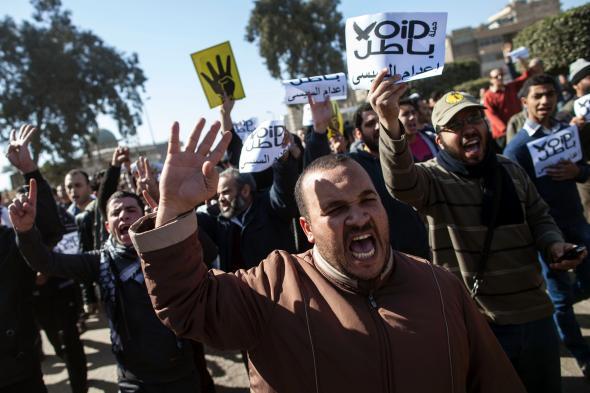This morning, an Egyptian court sentenced 529 people to death, a pretty staggering number given that state authorities across the world carried out a total of 682 executions in 2012, according to Amnesty International. The move is a major escalation of the military-led government’s months-long crackdown on Islamists in Egypt. But it is hard to believe that it will actually be carried out.
The defendants, most of them members of the now-banned Muslim Brotherhood, are accused of participating in attacks on Christians last August in the southern province of Minya. The riots occurred shortly after authorities forcibly dispersed Muslim Brotherhood protest camps in Cairo on Aug. 14—killing more than 600 supporters of ousted President Mohamed Morsi, a member of the Brotherhood.
According to eyewitnesses, a march of several hundred Muslim Brotherhood members and others arrived in Minya from a nearby town on Aug. 16. The angry crowd looted and torched nearly 40 churches and damaged 23 more. Several people were killed, among them the deputy commander of the district police station in Minya.
Egyptian authorities report that more than 16,000 people have been arrested in the sweeping crackdown on Islamists and other opponents since the military retook power last summer. In December the state declared the Muslim Brotherhood a terrorist group, and it has since been driven largely underground.
Lawyers called the hearings, which began Saturday, a “farce.” The defense team was reportedly prevented from making statements or objections, and most of the accused were barred from the courtroom. (Those present were held in a cage, per Egypt’s recent tradition.) A relative of one of the defendants told Reuters: “When the trial starts on Saturday and it is just a procedural hearing, and the judge doesn’t listen to any lawyers or witnesses and doesn’t even call the defendants, you are before a group of thugs and not the judiciary.”
The convicted group can appeal the ruling, and legal experts say the case is likely to be overturned or rejected by the Grand Mufti, the country’s official authority for issuing religious edicts, who reviews all capital punishment sentences. The court determined that a final verdict would be issued on April 28. In any case, the idea that Egypt would actually execute the 529 people it sentenced to death today is far-fetched. A state execution on that scale would be unprecedented, and as Karim Medhat Ennarah of the Egyptian Initiative for Personal Rights points out, it would be impossible to prove that each of the 500 people had a significant part in the killing of a single police officer. He adds: “Clearly this is an attempt to intimidate and terrorize the opposition, and specifically the Islamist opposition.”
The real concern is that trials like these happen at all. In fact, they’re becoming increasingly common in Egypt: 683 people—including the Brotherhood’s Supreme Guide Mohammed Badie—will face a Minya court tomorrow on charges of incitement to kill protesters in Cairo last June.
In the capital, meanwhile, prominent activists Alaa Abdel Fattah and Ahmed Abdel-Rahman were released on bail yesterday in a rare act of clemency. They will return to court on April 6 to face trial on charges of organizing an illegal protest against military trials of civilians.
The perpetrators of last year’s Minya attacks must be held to account. If Egyptian law prescribes capital punishment for proven murderers who receive a fair trial, so be it. But Egypt’s military-led government only further radicalizes its opponents by holding absurd trials such as these. The state’s brazen methods may ultimately make the country’s security situation worse.
